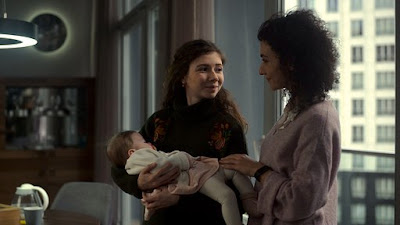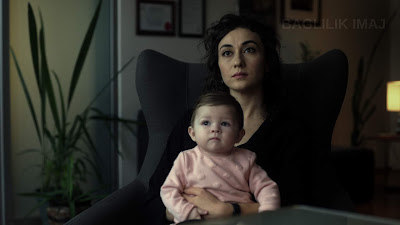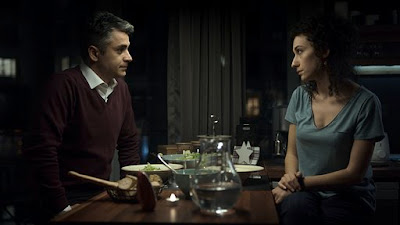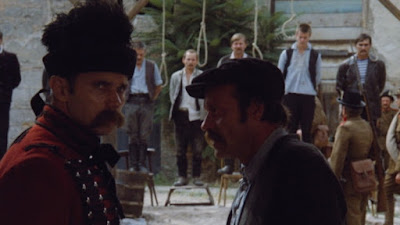 |
| The poster captures the essence of the film-- the child is the fulcrum of the tale, with the mother almost absent in the frame |
Film directors and screenplay writers Semih Kaplanoglu and Nuri Bilge Ceylan are the
leading lights of Turkish cinema today. Their contributions have understandably
resulted in Turkish films being considered among the very best in the world in
recent decades. Unfortunately, Kaplanoglu’s previous film Grain made in
2017 has been totally neglected by most cineastes, even though the film won the
top honor at the 2017 Tokyo film festival and was made in English on a subject
that ought to interest a larger educated film-going global public. It possibly
antagonized the powerful lobby of private sector involved with agricultural genetic
engineering that effectively curtailed the film’s distribution and publicity
worldwide, similar to the case of the Cannes-award winning European film Little
Joe (2019). Grain was a departure for Kaplanoglu, not just for venturing
into the world of science fiction but for leaving the recognizable Turkish geographical
territory for an indistinguishable one, set in a near-future time frame.
Semih Kaplanoglu’s
film Commitment marks a u-turn for the director from Grain. In
Commitment, he returns to a very identifiable Turkey, its contemporary
status, and the Turkish language. Five of his earlier feature films (he had
made six) focused on male figures,
markedly in his Yusuf trilogy comprising the films Honey, Milk,
and Egg, though women had secondary but important roles in those films. Only his second film, Angel’s Fall,
primarily focused on a woman. In Commitment, too, he returns, after
four films, to focus once again on women.
Turkey, like Russia,
is largely located in Asia and less in Europe. Both countries, however, prefer
to be identified as European than Asian (e.g., the denizens of the city of Vladivostok
situated in Asia). Turkey, in recent years, has been making a bid to be a part
of the European Union, disregarding its Asian connection and heritage. The richer sections of Turkey’s population are
rapidly moving closer to European life styles, while the poorer sections still
retain the Asian traditions in their social lifestyles.
 |
| Asli (right) hires Gulnihal (Ece Yuksel).to take care of her baby while she returns to her job as a banker |
In Commitment, Asli
(actress Kubra Kip) is a well-to-do banker in her late twenties or early
thirties, who has given birth to her first child and wants to return to job at
the earliest, and attempts to regain her pre-childbirth physical allure. She is
not always able to take care of her child, dislikes breast feeding her child, neglects
the indoor flowers in her house, and cannot cook well enough to please her
husband (she serves cold potato salad of the previous day to her husband when
he returns from work). For Asli, her career and her looks are more important
than her family responsibilities. Even
her gynecologist doctor does not approve her returning to work soon after
childbirth and dislikes her requests for medication to reduce her lactation for
the sake of maintaining her appearance. Asli
represents the richer middle class of Turkey yearning to mimic European
lifestyles and objectives. Kaplanoglu’s Commitment underscores the fact
that despite the wealth of the nouveau-riche, the upper middle-class nuclear families
in Turkey are clearly missing self-fulfillment.
In contrast to Asli,
the contrasting socio-economic elements of Turkey are embodied in Gulnihal
(actress Ece Yuksel), essentially from a village background. Gulnihal is hired
by Asli as a babysitter-cum-domestic help to look after her child as she
returns to her life as a city banker. On her return to work, Asli finds that
she has been given a less important position in the bank following her return
from maternity leave than the one she held before. Yet Asli hangs on to the less-attractive
job, despite being downgraded. On the other hand, Gulnihal also works for Asli’s
family as she needs the money though she would rather be with her own child,
almost the same age as Asli’s. Gulnihal knows her child is in good hands—her
mother-in-law. Gulnihal, a young mother
herself, dotes on Asli’s child as her own and even breastfeeds Asli’s child
without seeking permission. Gulnihal
brings to the Asli household food prepared by her mother-in-law (a typical
Asian family gesture of goodwill transcending economic barriers) that Asli’s
husband appreciates assuming it was prepared by his wife. Evidently, Gulnihal
is relatively a happy individual unlike Asli who is a lot wealthier than her.
 |
| Asli's life lacks the true joy of being a mother, enjoying a good marriage, a child, and a job as a banker |
The film is also a
study in family relationships. The film
presents multiple subplots relating to the family members of Asli (her parents
and siblings and their feelings towards her), the family of Asli’s husband (his
parents and their relationship towards him) and finally Gulnihal’s relationship
to her husband, mother-in-law and her own child.
Add to all this
there are political commentaries relating to Turkey’s recent past history (a
newspaper or journal that continues to publish despite its dwindling readership,
is one example) that Turkish viewers might comprehend better.
Commitment is
a film based on an original script written by Kaplanoglu himself. The
strengths of the film lie in the script (a male scriptwriter dealing with so
many female viewpoints) that is complex and yet a delight for astute viewers,
the direction of a very talented filmmaker, the crisp cinematography of Andreas Sinanos and finally a very good ensemble cast. The initial visual of the film (which would perplex the viewer) is
replicated at the end where the significance falls into place.
This critic viewed
the film in a packed auditorium at the International Film Festival of Kerala
which possibly did not have a single Turk in the audience. That audience loved the
film and was clapping away after the film ended. (The director and crew were
not present and, therefore, the reaction of the audience was spontaneous and genuine.)
 |
| Asli and her husband have a meal at home--the food becomes an important tool of non-verbal communication |
Commitment was
Turkey’s submission for the 2019 Oscars in the foreign language category. But
it did not earn the nomination even though the film’s screenplay and direction
are commendable. Nuri Bilge Ceylan pips Kaplanoglu in international stature
because the former has succeeded in infusing internationally accepted literary
connections, while Kaplanoglu (with the exceptions of Grain and perhaps Honey)
has made films that Turkish audiences would relate to more than international
ones. Despite this, Kaplanoglu and Ceylan are filmmakers, whose every new film
is well worth the wait.
P.S. Commitment is one of the author's top 20 films of 2019. It won the Best Director award at the Bosporus (Bosphorus) Film Festival. Kaplanoglu’s three films Grain (2017), Honey (2010), and Milk (2008) have been reviewed earlier on this blog. Significantly, two other major women-centered films made in 2019, Vitalina Varela and Beanpole were made by male directors/screenplay writers and have been reviewed
on this blog. (Click on the names of the films in this post script to access
the reviews.)









